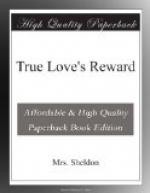She had promised that she would give herself to Ray at the end of three months; he still held her to that promise, and six weeks of the time had already elapsed, and she seemed to be no nearer the attainment of her desires than when she had made it.
True, she had found the picture of her mother, and learned that her name was Mona Forester. She had also discovered that a relative had been seeking for her with the desire of leaving her all that he possessed.
But all this was very unsatisfactory, for she had not gained the slightest clew by which to prove herself to be the child of Mona Forester, or any one else.
It was all a wearisome and harrowing tangle, and it wore both upon her spirits and her strength.
It was true, too, that she had found Ray, and learned that he loved her. This was a great comfort, and she knew she had but to tell him that she was ready to go to him, and he would at once make her his wife; but—a flush of shame flooded her face every time she thought of it—she was continually haunted by the fear that her mother might never have been Richmond Montague’s wife—that possibly she might have no legal right to the name she bore, in spite of her uncle’s assurance to the contrary, and she shrank from marrying Ray if any such stigma rested upon her.
She had never breathed these fears to him—she kept hoping that some accident, or some remark from Mrs. Montague, would throw light on the perplexing mystery.
But Mrs. Montague never referred in any way to her past life in her presence. She had never once mentioned her husband, and, of course, Mona had not dared to ask her any questions upon these subjects.
“I can never marry Ray until I know,” she had told herself over and over in great distress, “for I love him too well ever to bring any blight upon his life.”
She had had a dim hope that Mr. Corbin might in some way manage to unravel the mystery, and yet she could not see that he had anything more tangible to work upon than she herself had.
Mona finished the dress and carried it to Mrs. Montague, who seemed very much pleased with it.
“You are a lovely seamstress, Ruth, and a good, faithful girl,” she said, as she carefully examined the neatly made garment. “But for one thing,” she added, as she covertly searched the girl’s fair face, “I believe I should grow really fond of you.”
This remark put Mona on her guard in a moment, though it also set her heart to beating with a vague hope.
“Thank you for your praise of my work, Mrs. Montague,” she quietly said, “but,” lifting a wondering glance to her face, “what is the one thing that I lack to win your esteem? If I am at fault in any way I should be glad to know and correct it.”
“You lack nothing. It is because you so much resemble a person whom I used to detest—I am unaccountably antagonized by it,” said the woman, frowning, for the clear eyes, looking so frankly into hers, were wondrously like Mona Forester’s.




